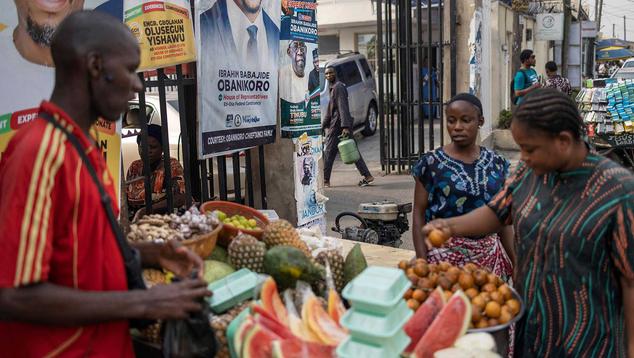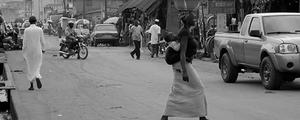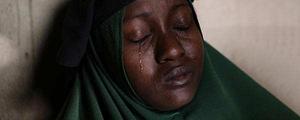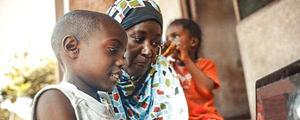Story Highlights
- Nearly all Nigerians see government as corrupt
- Widespread inability to afford basics as cash crisis deepens
- Millions feel unsafe walking alone
WASHINGTON, D.C. -- Millions of Nigerians will vote on Saturday in what many view as the most important election in Africa this year. Gallup surveys conducted ahead of the election shed light on three key issues that will likely be on voters’ minds as they elect their next president and remain challenges for whoever emerges as the victor.
Quick Summary: Nigerian voters will decide which of the three main candidates will succeed incumbent President Muhammadu Buhari, who is term-limited after eight years in office.
Bola Tinubu, the All Progressives Congress (APC) candidate, commands perhaps the widest support network across the country. Yet concerns about his age, 70, and purported health issues have dogged his campaign. Atiku Abubakar, representing the People’s Democratic Party (PDP), previously served as vice president from 1999 to 2007. He has made five failed attempts at a presidential run but hopes to capitalize on support from the majority Muslim North.
Nigerians have elected presidents from either of these two dominant parties in the past decade, but all presidents have seen their approval decline toward the end of their terms. Currently, just 26% of Nigerians approve of the job that Buhari -- who is a member of the APC -- is doing.
Perhaps the biggest story of the electoral season has been the appearance of Peter Obi, a businessman and former governor of Anambra State who has emerged as a dark horse candidate for the center-left Labor Party. Obi has led in a number of opinion polls in recent days, running on a platform of anti-corruption and economic growth.
Nigerians Universally See Government Corruption as Widespread: The 94% of Nigerians who say corruption is widespread in their country’s government is not only just as high as it was when Buhari took office in 2015, but also one of the highest rates in the world. Buhari was elected at least partly because of his strong stance on tackling corruption. During Buhari’s first two years in office, Nigerians’ perceptions did improve somewhat, but since then, the percentage who view corruption as rampant has climbed steadily.
Closely tied to government corruption is the democratic cornerstone of free and fair elections. In previous elections, there have been reliable reports of poll rigging through violence and ballot stuffing.
In 2022, fewer than one in four Nigerians (23%) expressed confidence in the honesty of their country’s elections. This is considerably lower than the 34% who said so in 2018, the year before the last presidential election.
Faith in elections varies drastically across Nigeria. Almost no one is confident in the honesty of elections in the South East (1%), where there are growing calls for secession to create the State of the Indigenous People of Biafra (IPOB). Likewise, just 6% trust the honesty of elections in the North West.
Voter turnout in 2019 was low (35%), driven in part by perceptions of corruption and foul play, meaning that turnout could again play a key role in this election.
Majority of Nigerians Struggle to Afford the Basics: Nigeria was hit hard by inflation in 2022. In the second half of last year, annual inflation rates rose above 20%.
This is particularly damaging to a country where three in four people struggle to afford food, and just under half (48%) struggle to afford adequate shelter.
Southern regions of Nigeria have been affected particularly badly. The vast majority of those in the South (89%), South East (84%) and South West (85%) have struggled to afford food at times in the past year.
The recent cash crisis in 2023 caused by the suspension of old banknotes has added to the financial turmoil. People have struggled to access their money, and mobs have attacked commercial banks as a result.
To add to the economic pain, there are also widespread petrol shortages in a nation known for producing crude oil.
Whoever wins will need to tackle structural economic issues in a country where twice as many people say their local economy is getting worse than say it is getting better (60% vs. 31%, respectively).
Nigerians Feel Less Safe Than They Did When Buhari Took Office: Buhari was elected on a strong counterterrorism platform but has failed to stem insecurity during his presidency.
Insecurity is a nationwide problem, including a kidnapping-for-ransom crisis, militant Islamist insurgencies in the North and recent attacks on the electoral commission in the South East.
In the current climate, slightly more than half of Nigerians (53%) feel safe walking alone at night. This represents a significant drop in perceived public safety since the start of Buhari’s first term (61%).
Muslims are far more likely than Christians (69% vs. 39%) to feel safe walking alone at night. Nigeria has a long history of religious-based violence, and many who live as religious minorities throughout the country feel discriminated against.
For the first time since Nigeria returned to democracy in 1999, the governing party has diverged from the tradition of having both a Christian and a Muslim stand for election as president and deputy. This has the potential to further inflame religious-based violence.
Approval ratings of the current administration are at record lows, and more than twice as many Nigerians have confidence in their national military (69%) than their government (31%).
This comes at a time when the military has had to refute a claim from the APC that it is plotting to disrupt the election.
Implications
Whichever candidate wins the presidency will lead a country facing crises on multiple fronts. Corruption, economic decline and insecurity all pose huge challenges to the next administration and civil society.
The democratic foundations of Africa’s most populous nation are under strain. Almost all Nigerians have little to no faith in the integrity of their government.
The next few weeks may prove decisive for the future of Nigeria.
To stay up to date with the latest Gallup News insights and updates, follow us on Twitter.
For complete methodology and specific survey dates, please review Gallup's Country Data Set details.
Learn more about how the Gallup World Poll works.




